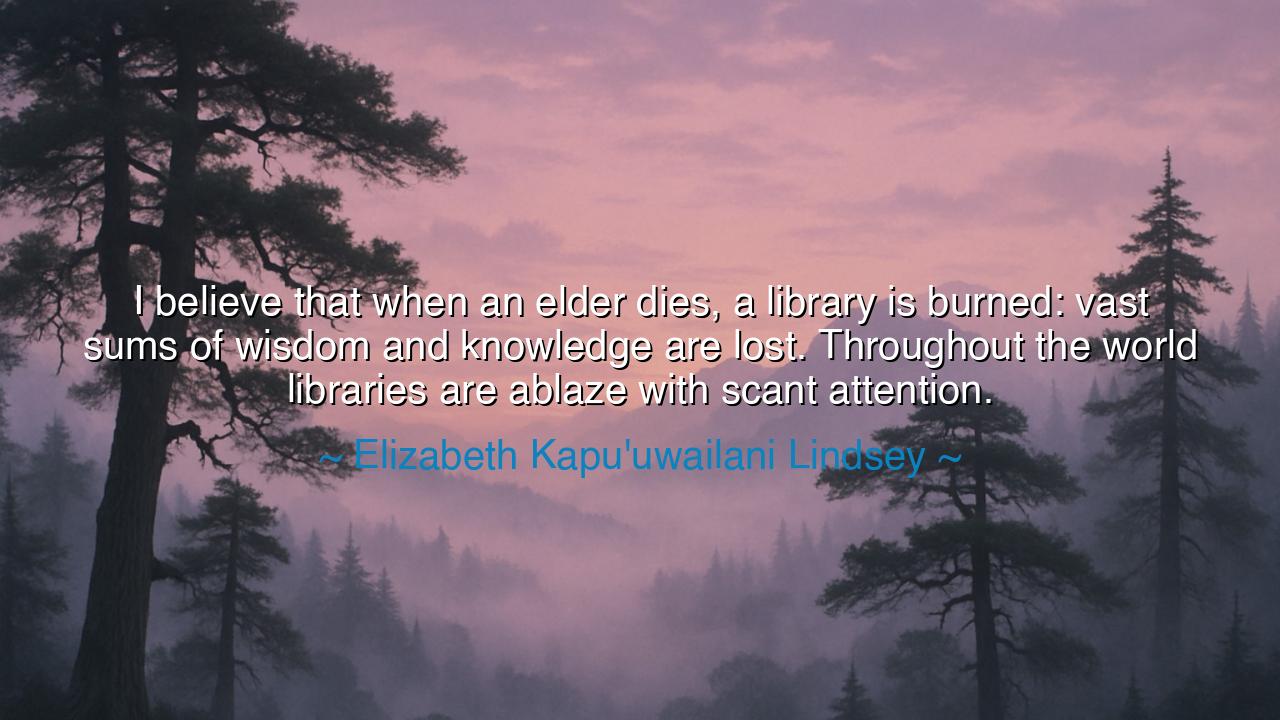
I believe that when an elder dies, a library is burned: vast sums
I believe that when an elder dies, a library is burned: vast sums of wisdom and knowledge are lost. Throughout the world libraries are ablaze with scant attention.






When Elizabeth Kapu’uwailani Lindsey, the anthropologist, explorer, and storyteller of the Pacific, said, “I believe that when an elder dies, a library is burned: vast sums of wisdom and knowledge are lost. Throughout the world libraries are ablaze with scant attention,” she spoke with the voice of an ancient seer mourning the fading fire of humanity’s memory. Her words carry the grief of forgotten stories and the reverence of one who knows that knowledge is not only written in books, but carried in hearts — in the songs, the proverbs, and the lived experiences of the elders who came before us. She reminds us that the truest archives of civilization are not made of parchment and stone, but of flesh and spirit. When an elder passes, a world vanishes — a world that will never again be spoken in quite the same way.
The origin of this quote lies in Lindsey’s deep work as an anthropologist and Polynesian navigator, traveling across the Pacific to preserve the oral traditions of indigenous cultures. As she listened to the elders — navigators, farmers, healers, and storytellers — she realized that their wisdom, carried for centuries through oral transmission, was vanishing faster than it could be recorded. Their knowledge of the stars, the sea, the winds, the human soul, was not the product of formal schooling, but of generations of experience and intuition. To her, each elder represented not one person, but an entire library — a living vessel of ancestral truth. And with their deaths, humanity loses entire chapters of understanding about harmony with nature, with community, and with the self.
Her metaphor of the burning library is both poetic and tragic. A burning library is not only a symbol of loss, but of neglect — for fire consumes only when no one guards the flame. When she says “libraries are ablaze with scant attention,” she laments our indifference — our failure to sit with the old, to listen to their stories, to honor the wisdom that age brings. In our rush toward innovation, we often abandon memory; in our hunger for progress, we forget our roots. The elders sit quietly, carrying within them the lessons of joy and suffering, of creation and loss — yet the world passes them by, heads bent to screens, ears deaf to the sacred voice of experience.
History offers us painful examples of this truth. When the Library of Alexandria was destroyed, the world lost irreplaceable treasures of science, philosophy, and art. Yet as Lindsey implies, that catastrophe repeats itself every day in silence, not by flame but by forgetfulness. When an old farmer dies without passing on his knowledge of the soil, when a grandmother’s stories fade before being told, when a healer’s remedies die with her — we lose a civilization as surely as if a temple had fallen. Humanity does not perish all at once; it erodes, one forgotten voice at a time.
Yet within her sorrow, there is also a call — a call to remember and preserve. Lindsey’s quote is not merely lamentation; it is a summons to action. She urges us to become the keepers of our elders’ wisdom, to seek them out before their voices fall silent. Sit at their feet. Ask them about their journeys, their mistakes, their joys. Record their memories. Let the young become the scribes of the old, so that the libraries of humanity may live on in living hearts. For wisdom that is shared does not die — it multiplies. Every story preserved becomes a bridge between generations, between what was and what can yet be.
In her own work, Lindsey followed this path with devotion. She traveled across islands, listening to navigators who could read the stars without maps, to healers who understood the body through harmony, and to elders who spoke of community as family, and land as spirit. She became their student and their voice, helping preserve a body of wisdom that modernity might have otherwise forgotten. Through her, we learn that education does not only happen in schools — it happens in the quiet conversations with those who have lived long enough to see the patterns of life unfold again and again.
The lesson of her words is both sacred and urgent: do not let the libraries burn. Honor your elders — not merely with affection, but with attention. Seek their stories while they can still be told. Let every home become a library of voices, and every conversation a preservation of culture. In this way, we do not only honor them; we preserve ourselves. For when the wisdom of the old meets the curiosity of the young, the fire of civilization is rekindled.
So let Lindsey’s words echo like a timeless chant across the generations: listen before it is too late. The elders are the roots of the tree, the memory of the tribe, the whisper of eternity. When they go, their wisdom must not turn to ash — it must become flame, passed from heart to heart. For only by honoring those who remember can we, who inherit the future, truly understand who we are.






AAdministratorAdministrator
Welcome, honored guests. Please leave a comment, we will respond soon